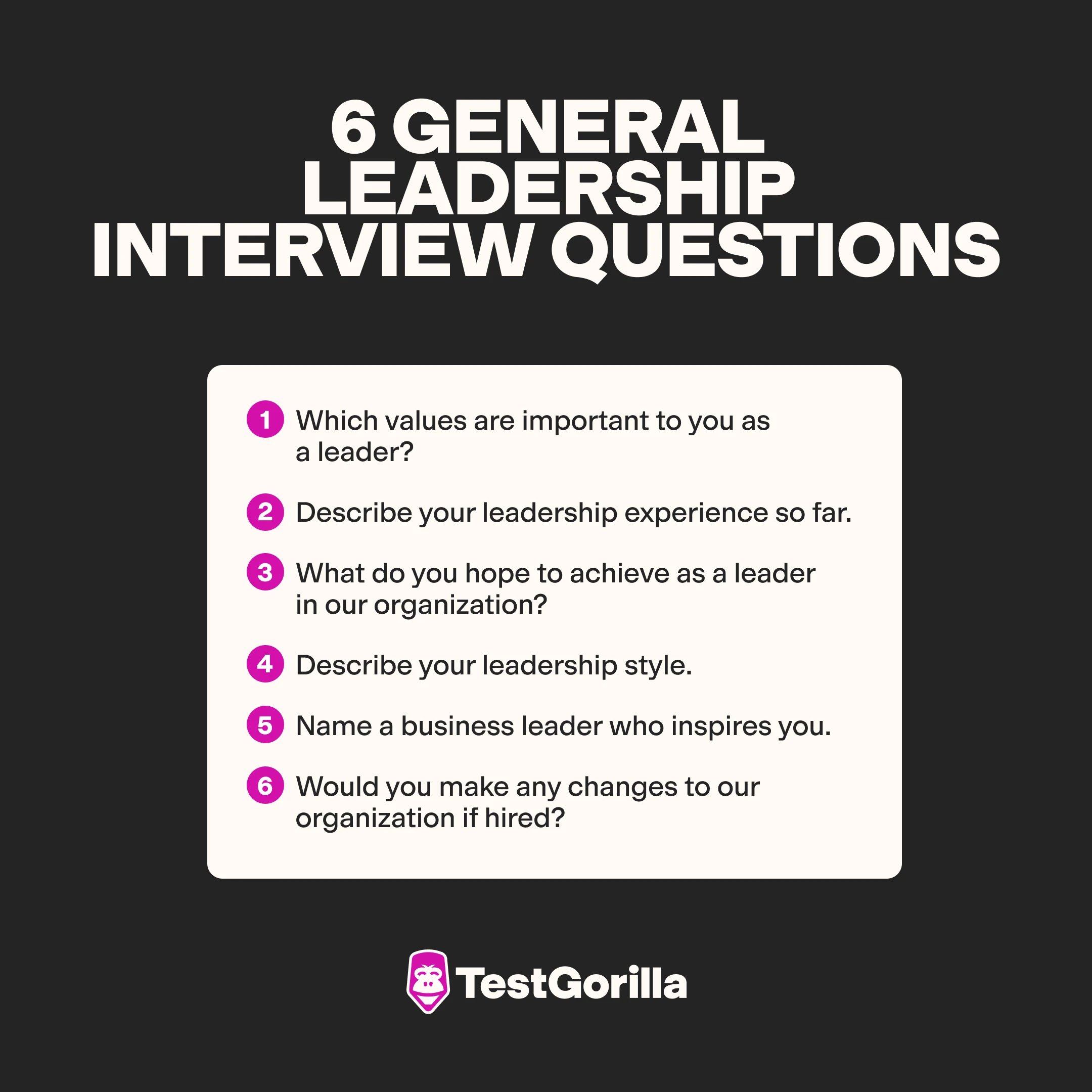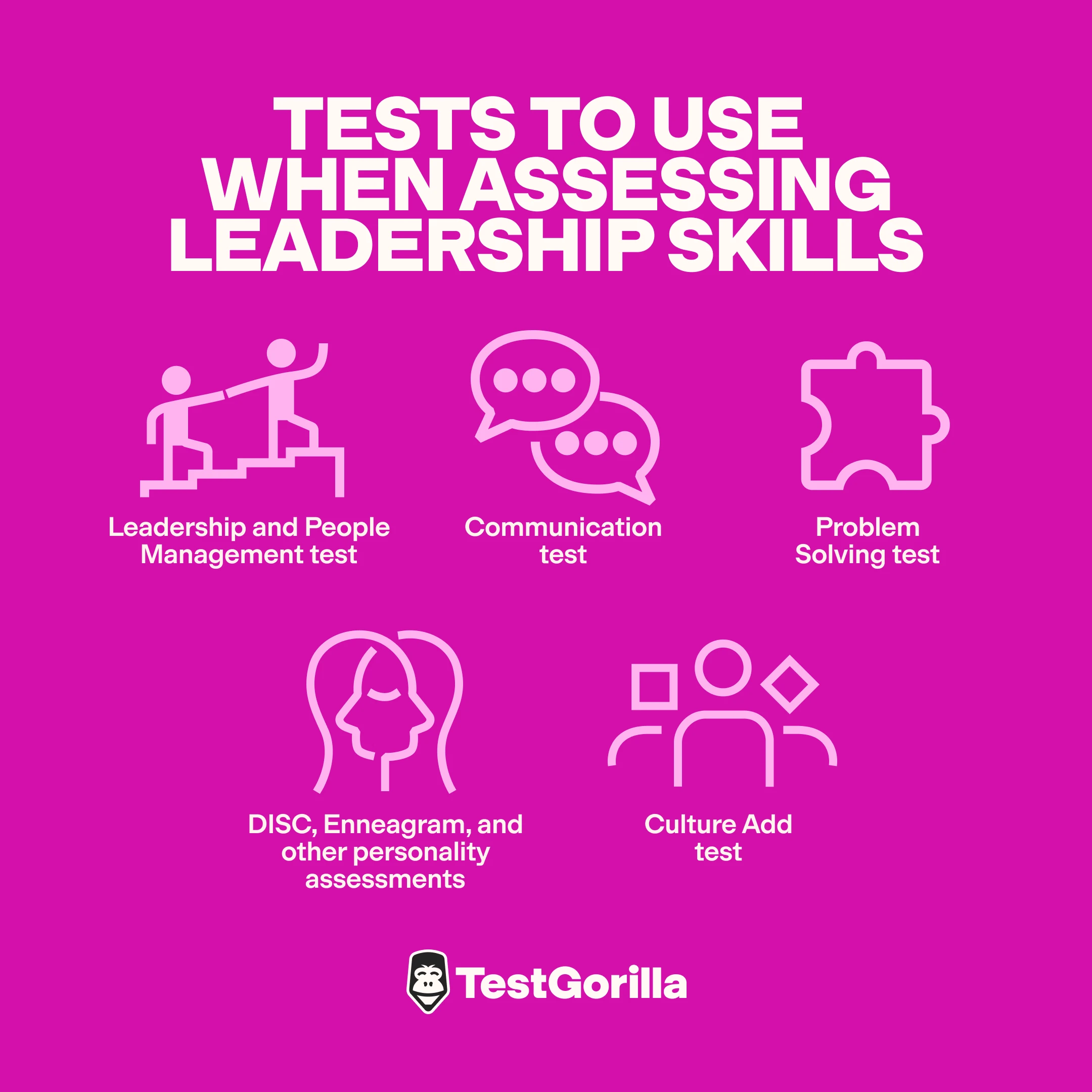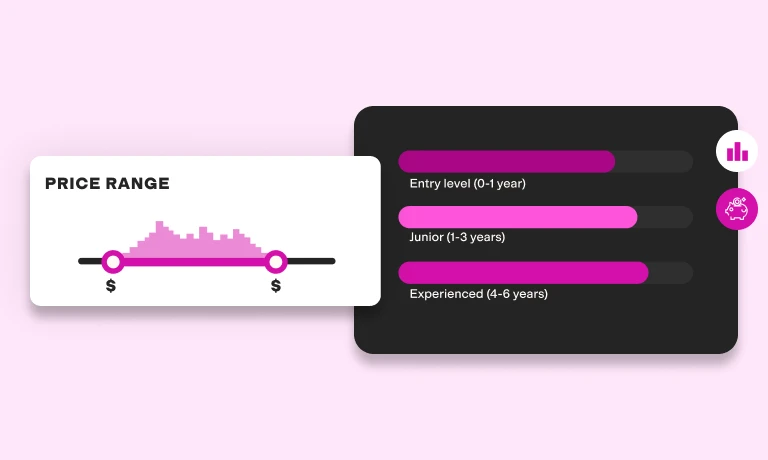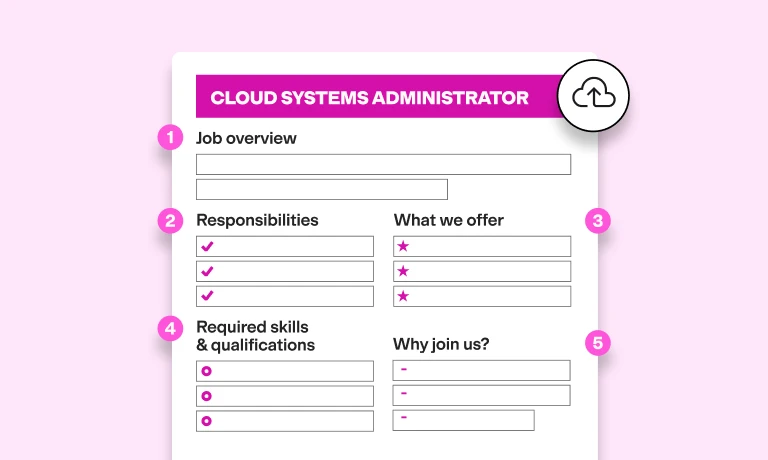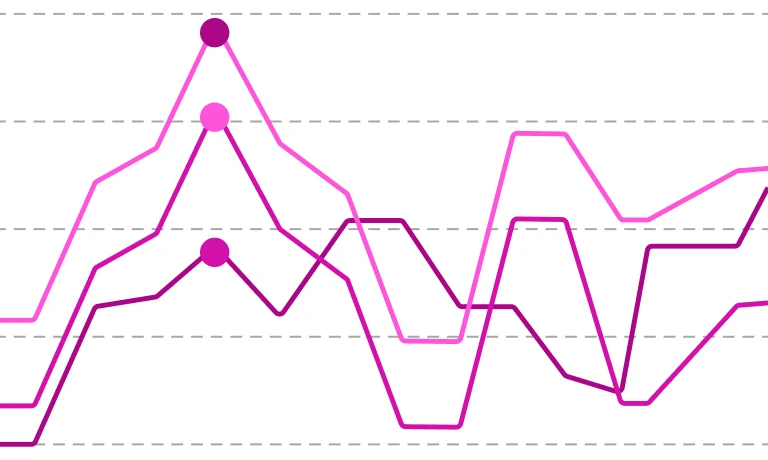25 leadership interview questions to ask your candidates
Good leaders are the compass of any business – providing direction, keeping teams on course, and guiding them successfully through change. But hire the wrong person, and you could face setbacks, poor team morale, and even a blow to your bottom line.
Unfortunately, this isn’t uncommon, and mis-hiring leaders often stems from focusing too much on technical expertise and neglecting leadership skills when selecting a candidate.
One way to avoid this is with a strong set of interview questions that can dig deeper into your candidates before you make an offer.
This guide provides 25 well-rounded leadership interview questions, plus tips on accurately measuring leadership skills so you can hire someone who truly has the chops to lead your team effectively.
25 leadership interview questions to ask potential leaders
Here are 25 interview questions that can help you assess candidates on the most essential leadership skills and traits.
6 general leadership interview questions
These questions dig into what makes a leader tick – what they value, how they’ve led teams before, and their goals for leading your company’s employees. Good candidates will clearly outline their previous leadership experiences, including how many people they were responsible for and the nature of their role.
The best answers will also show that candidates have researched your company and have a concrete answer to why they think they’ll be a good fit to lead your people.
It’s important to listen carefully to understand candidates' natural leadership styles – for instance, are they autocratic, democratic, transformational, etc? Also, which other leaders do they idealize? This will help you identify candidates whose style aligns with your company’s values and culture.
Here are six questions to assess your candidates’ general leadership preferences.
Which values are important to you as a leader?
Describe your leadership experience so far.
What do you hope to achieve as a leader in our organization?
Describe your leadership style.
Name a business leader who inspires you.
Would you make any changes to our organization if hired?
Want to learn more about different leadership styles? Here's our complete guide to 10 leadership styles and when they're effective.
5 leadership interview questions about emotional intelligence
Leadership questions relating to emotional intelligence help you gauge how candidates understand and manage their own feelings and those of their team. This is key to building a strong team that feels supported and looked after.
When interviewing candidates, look for clear examples of how candidates can balance empathy with keeping an emotional distance from team members’ circumstances. Also, find out how they give positive and negative feedback, paying particular attention to whether they can change their communication style to suit each scenario.
Lastly, look for answers that show leaders are skilled in regulating their emotions, for instance, when breaking difficult news with the team or when receiving negative feedback themselves.
Here are five questions that can help you measure candidates’ emotional intelligence.
What approach would you use to deliver positive vs. negative feedback to a team member?
How would you react to receiving negative feedback from a subordinate?
Your team feels demotivated after a project fails. How would you motivate them?
Have you ever had to restructure your team? What approach did you use to manage those who were impacted and the team members who stayed?
How do you handle a situation where a team member is emotionally struggling?
5 leadership interview questions about decision-making
Leaders often face tough choices, and how they make decisions tells you a lot about their critical thinking and problem-solving capabilities, judgment and priorities, and overall thought process. When evaluating candidates’ answers, seek detailed accounts of situations that required tough decision-making.
Note how candidates make their decisions, with bonus points for balancing data with their gut instincts and a strong knowledge of their sector. Also, ensure you learn about the outcomes of their choices and how they use insights from their experiences to improve decision-making in the future.
Here are five questions to learn about your candidates’ decision-making skills.
Describe a situation when you had to make a difficult decision.
What process do you follow when encountering a problem with multiple possible solutions?
Describe a decision you made that involved significant risk. What factors did you consider, and what was the outcome?
Can you give an example of a decision you made that was a mistake? What did you learn from it?
How do you involve your team in the decision-making process?
4 leadership interview questions related to adaptability and change management
Adaptability is all about being flexible and open to change. Look for leaders who stay resilient in the face of change and talk about how they’ve been able to shift gears or rethink their plans when new information comes in.
Also, prioritize those who dive deeper into how they led their teams through periods of uncertainty, redeployed resources effectively, and kept the company’s vision alive – inspiring people to work toward their collective goals no matter the circumstance.
Here are four questions that can help you measure candidates’ adaptability.
Tell me about a time you had to change your decision because of new information.
Describe a time when you had to adjust to a significant, unexpected challenge quickly.
How do you communicate significant changes to your team?
What strategies do you use to handle resistance to change within your team?
5 leadership interview questions to measure integrity
Integrity is crucial in a leader – it builds trust with a company’s employees, customers, and investors. Plus, it sets the standard for everyone else. Select leaders who consistently exhibit integrity in their actions, have the company’s best interest at heart and stand by their principles even in difficult situations.
How they handle these moments, especially under pressure, tells you a lot about their character and helps you shortlist those in sync with your company’s values.
Let’s look at five questions that evaluate potential leaders’ integrity.
Have you ever had to make an unpopular decision? How did you deal with disgruntled stakeholders?
Describe a situation where your integrity was challenged. How did you respond?
What do you do to ensure fairness in decision-making within your team?
How do you maintain ethical standards under high-pressure situations?
How would you handle the situation if you discovered a high-performing team member was behaving unethically? What steps would you take to address it?
What roles can you use leadership interview questions for?
The great thing about leadership interview questions is that you can use them for managers, team leaders, and senior management in various fields. Whether you’re hiring a head teacher for a school, a developer team lead, a marketing director, or an accounting manager, these leadership interview questions are ideal.
Remember to ask follow-up questions to dig deeper into your candidates’ experience and give them a chance to ask you questions at the end of the interview.
The best insights on HR and recruitment, delivered to your inbox.
Biweekly updates. No spam. Unsubscribe any time.
The best way to assess leadership skills
Leadership skills, like other soft skills, are difficult to measure objectively via resumes or interviews. This is because there's no easy way to verify candidates' answers and experiences. The most foolproof way to accurately assess leadership skills is through pre-employment tests with platforms like TestGorilla.
Our library of 350+ tests lets you screen candidates holistically. Consider the following tests for your next leadership role:
Communication test
Problem Solving test
DISC, Enneagram, and other personality assessments
Once you've received candidates' results, use these to make data-driven decisions about who to shortlist for interviews and what questions to ask them.
Find a capable leader with TestGorilla
Good leaders are essential for setting your company's vision and mission and driving employees to achieve it. However, it's easy to overlook leaders' soft skills in the hiring process, and even employers who want to vet these skills can struggle using interviews alone.
The best approach to finding a competent leader for your organization is to combine TestGorilla’s skills tests and leadership interview questions; it’s a fast, efficient method to assess applicants and create a shortlist.
Keen to explore our tests? Create a free TestGorilla account today.
Related posts
You've scrolled this far
Why not try TestGorilla for free, and see what happens when you put skills first.


